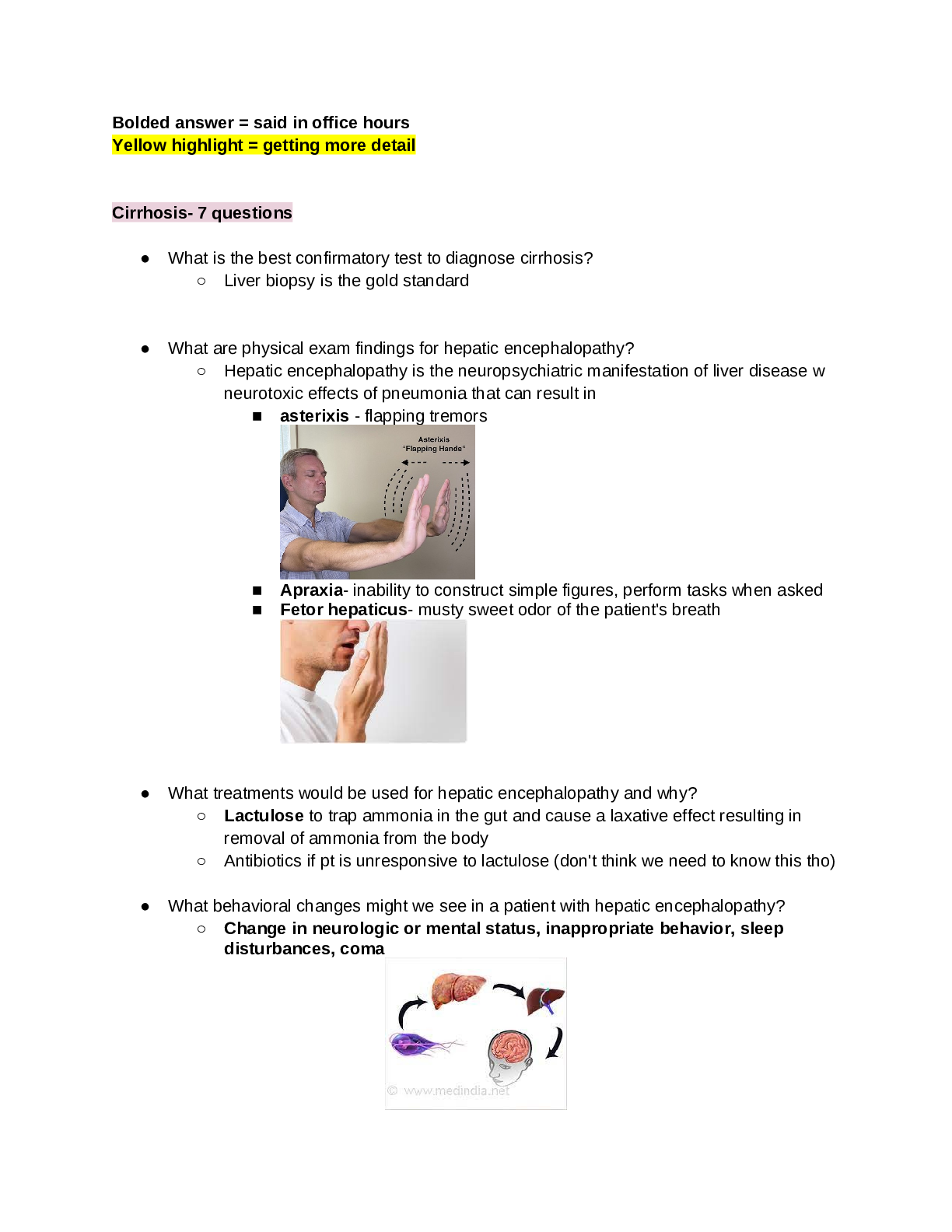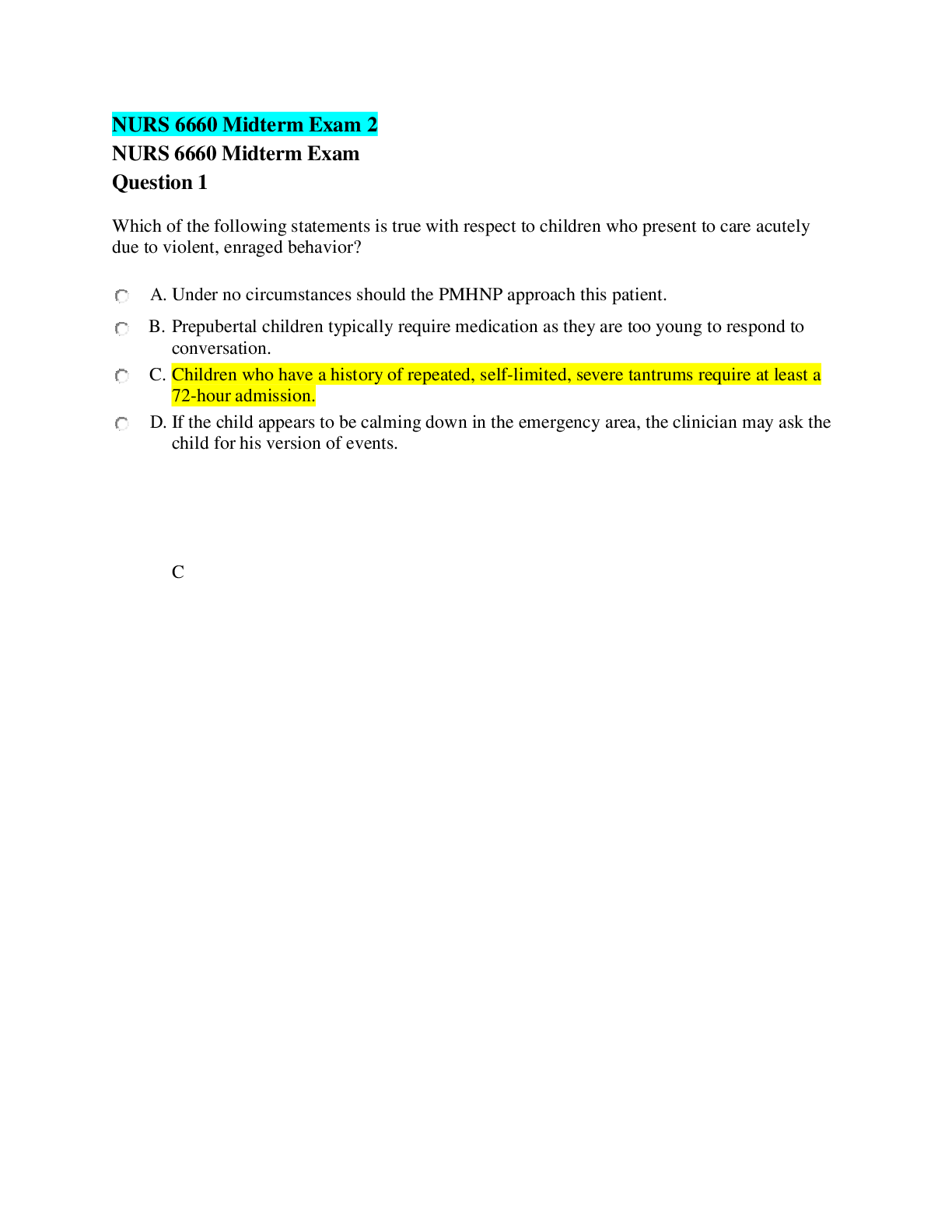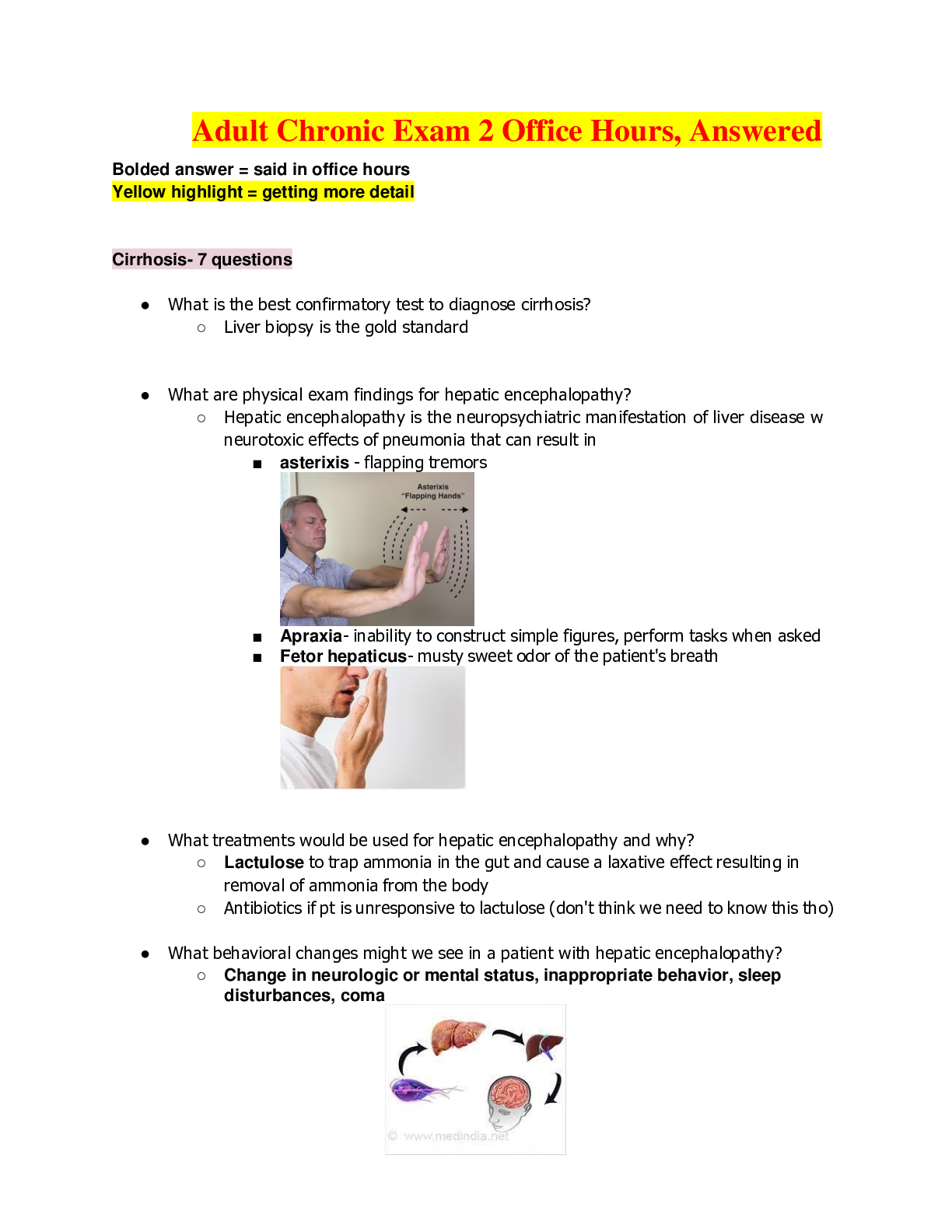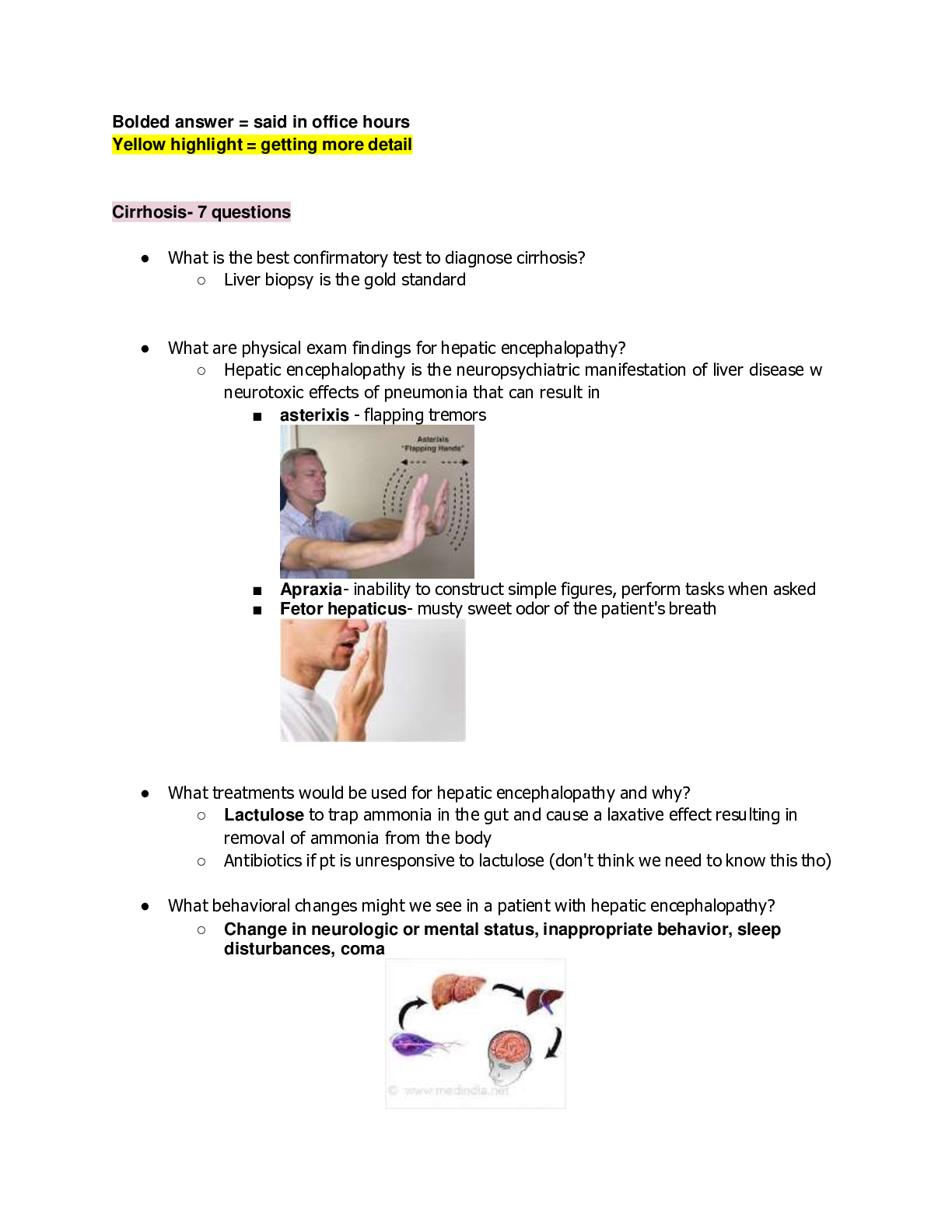*NURSING > EXAM > Exam (elaborations) NUR 4768 (NUR4768) Adult Chronic Exam 2 Answered and Elaborated well. (All)
Exam (elaborations) NUR 4768 (NUR4768) Adult Chronic Exam 2 Answered and Elaborated well.
Document Content and Description Below
Bolded answer = said in office hours Yellow highlight = getting more detail Cirrhosis- 7 questions ● What is the best confirmatory test to diagnose cirrhosis? ● What are physical exam findings ... for hepatic encephalopathy? ● What treatments would be used for hepatic encephalopathy and why? ● What behavioral changes might we see in a patient with hepatic encephalopathy? ● What are nursing interventions that we would incorporate for a pt who has esophageal ● What medication would we use to treat ascites? ○ Diuretics to remove excess fluid from the body ○ “Dont need to know specific name” ● After a paracentesis to treat ascites what are concerning findings we would look out for? GERD/HH- 3 questions ● What are lifestyle recommendations for someone with GERD/HH? ● What does Barrett's esophagus raise a risk for? ● How would you educate a patient for pharmacological treatment r/t GERD, specifically PPIs? ■ SEs: decreased bone density, kidney disease, decreased B12/mag, dementia ○ Ex. omeprazole, prilosec- PPIs decrease HCl secretion and esophageal irritation IBD: Crohn’s & Ulcerative Colitis- 5 questions ● What is a normal presentation of Crohns? ● Scenario for a pt- determine who needs to be seen most urgently/prioritization ● What type of education would we provide to a patient who is getting a colonoscopy? What should the pt expect? ● What surgical intervention is used for Crohns? ○ Uncommon, but done for complication. ○ Resection of disease sections with reanastomosis- removal of unhealthy intestine and reconnect the healthy intestine ■ Recurrence likely ■ Short bowel syndrome possible ● Can be caused by surgical removal which results in inadequate surface reabsorption to maintain life ○ Strictureplasty: opening narrowed areas ● What is a typical presentation of ulcerative colitis? What is going to be our nursing priority r/t their labs? ● What surgical intervention is used for ulcerative colitis? ○ Curactive total proctocolectomy ■ Temporary: Ileal pouch/anal anastomosis: removes colon and rectum while preserving the anal sphincter. Pouch is formed at the end of the sm intestine; 8-12 weeks ■ Permanent ileostomy: one stage operation of removal with closure. End of the terminal ileum is brought out of the stomach, usually RLQ ○ Diverticulosis/Diverticulitis- 2 questions ● What is the typical presentation for diverticulitis? (scenario question & need to identify the conditiib) ● How would we treat diverticulitis? IBS/Hemorrhoids- 3 questions ● IBS-C: how do we manage it? (SATA, know general lifestyle recommendations) ○ Stress management, high fiber diet, food diary, low FODMAP diet (AVOID fruits, sugar, caffeine, alcohol, eggs, and wheat) get adequate fluids, exercise, and sleep, smoking cessation ○ Symptom-based treatment ● What would teach a patient who has hemorrhoids to do? What type of diet should they be on? How to provide pain relief? What could they take? ● What would we teach the pt post-hemorrhoidectomy? What would make their BM more comfortable? Urinary Incontinence/Urinary Retention- 7 questions ● What is stress incontinence? How do we manage it? ● What is urge incontinence? How do we manage it? (if have a question r/t mixed incontinence, know we would treat the urge portion with anticholinergics) ● What is functional incontinence? How do we manage it? ● What is overflow incontinence? How do we manage it? ● What test would we use to evaluate for urinary retention? ● For chronic urinary retention, what do we encourage the patient to do to manage it/what tool would we use to help them empty their bladder? Polycystic Kidney Disease (PCKD)- 2 questions ● “If someone has PCKD what type of drugs will we avoid?” ○ “NSAIDs” ● What do patients with PCKD go on to develop? Chronic Kidney Disease- 5 questions ● What are different labs for different stages do CKD patients present with? How would we assess for stage 3? Stage 5? What is the best test? ● ● What are risk factors for CKD? ○ DM #1, HTN #2, educate the pt that these factors predispose them to potentially progressing to CKD ○ To prevent progression, need to manage each of those conditions ● What are early s/s of CKD? ● What are important labs for CKD? What is our concern with low EPO & what do we need to monitor for? End Stage Renal Disease (ESRD)- 2 questions ● What classifies a patient to be stage 5 CKD or ESRD? What labs? ● What other findings might we see with stage 5 CKD/ ESRD? ● If a patient has ESRD and are on hemodialysis, what would we expect their labs to look like predialysis and postdialysis? What changes do we expect? ● In ESRD, do we have hypo or hyperparathyroidism? Identify clinical signs with ESRD. Dialysis- 2 questions ● What are some complications/most common complications from peritoneal dialysis? ○ PD Complications ■ Exit site or tunnel infection -> if untreated can cause peritonitis ■ Monitor for S/S: cloudy or opaque outflow is an early sign, fever, rebound abdominal tenderness, N/V, maintain meticulous sterile technique, prevent the catheter insertion site dressing from becoming wet ■ Gastrointestinal: D/V, distention ● Treat with antibiotics ● Repeat infections may cause adhesions ■ Hernias ● d/t Increased abdominal pressure from dialysate ● Treatment: hernia repair ■ Lower back problems ● Intraperitoneal infusion increases pressure ● Treatment: binders and exercise ■ Bleeding ● Common with initial catheter placement ● New-active intraperitoneal bleeding; check BP and hematocrit ■ Pulmonary ● Decreased lung expansion -> atelectasis, pneumonia, or bronchitis ● Elevate HOB, repositioning, deep breathing ■ Protein loss- monitor nutrition ??? ● If we have abdominal pain, tachycardia, and cloudy fluid draining, what are we now concerned for? ● With disequilibrium syndrome, what can we do to help combat this if we have a pt showing these s/s? CVA- 7 questions ● How would we communicate with a patient who has had a stroke? What types of questions should we ask? ● What can we delegate to a nursing assistant regarding a patient who had a stroke? ● What does FAST stand for? ● If a patient has a LEFT sided stroke, what do we have more issues with? Where? ● How would you handle an aggressive stroke patient? ■ Look at the 3 P’s- pain potty positioning ○ Redirect?? ● We want to bowel train for patients with a stroke if they have fecal incontinence ○ ● How do we want stroke patients to be in their care? ○ Encourage pt to still participate in their own care after stroke even tho they may have difficulties want to allow and encourage them to participate Parkinson's Disease- 4 questions ● What is the classic presentation of parkinsons? ● What drug helps with Parkinson's the most? What sx does it help? ● How would we want a patient with parkinsons to get up? ● What is the most common finding for someone with dementia? ● How could we assess a patient with possible dementia/what could we ask them to assess their short-term memory? ● How would you manage a confused/agitated dementia patient? ● What is the importance of maintaining a regular routine for these patients? Myasthenia Gravis (MG)- 2 questions ● What kinds of food do we want to give patients with MG? What consistency is recommended? ● If completing the tensilon test, what result would suggest a cholinergic crisis? ● If pt has increased muscle strength after taking tensilon → Multiple Sclerosis (MS) - 3 questions ● What is our goal for treatment of MS? ● What is the cause of MS? ● MS patients may have a flaccid bladder- how would we treat that? ● If confused and agitated dementia patient how would you manage that? ● Diet- what kind of foods do we want to give them? What consistency of food is recommended? ● What is our goal for treatment? To slow progression ● What is the cause of MS? ● MS pts may have flaccid bladder, how would we trx that? [Show More]
Last updated: 1 year ago
Preview 1 out of 15 pages

Buy this document to get the full access instantly
Instant Download Access after purchase
Buy NowInstant download
We Accept:

Reviews( 0 )
$13.00
Can't find what you want? Try our AI powered Search
Document information
Connected school, study & course
About the document
Uploaded On
May 22, 2024
Number of pages
15
Written in
Additional information
This document has been written for:
Uploaded
May 22, 2024
Downloads
0
Views
29


















